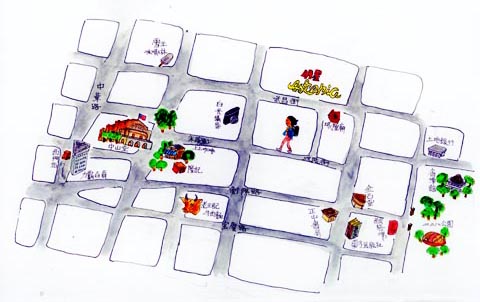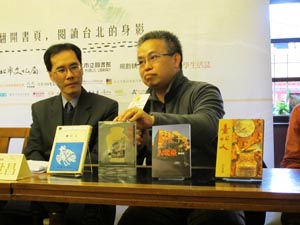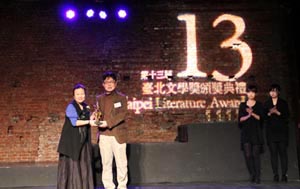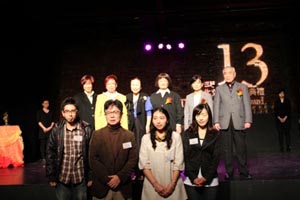Literary works depict diversity of Taipei City life
By Yali Chen Taipei is one of the world’s 24 most underrated cities, according to an article on the Yahoo! Travel website in early March. With acres of green space, an easy-to-use public transport system and cuisine, the city is now one of Asia’s most pleasant capitals, said the article on the search engine’s travel site. There is plenty to do for outdoor enthusiasts -- Yangmingshan National Park, hot springs in Beitou, hiking trails throughout the surrounding mountains, and riverside bike paths. Book lovers will especially enjoy the annual Taipei Literature Festival and Taipei Literature Award, organized by the city government and independent bookstores. The 2011 Taipei Literature Festival from February to May is opening with a series of events such as an exhibition of the history of Taiwanese literature, three literary tours, ten literary films and twelve speeches on the development of independent bookstores. Hsieh Hsiao-yun, Commissioner of the Taipei Department of Cultural Affairs, said that the number of book lovers visiting the Taipei International Book Exhibition Feb.9-14 reached 590,000 people this year, up 13.5 percent from a year earlier. “That figure showed a rise in local book fans,” she said, inviting those who love literature to enjoy the 3-month literary feast. Some of these books were out of print but others are still in print. One book titled “Taipei People,” written by the prolific author Pai Hsien-yung, is a fine collection of 14 short stories on the upper class Chinese who fled from China to Taiwan in 1949. It details lives of these rich and powerful families, so readers can get a better understanding of Chinese people residing in Taipei from 1949 to the 1980s. The novel was first published in 1970 and is now in its fourth edition with varied book cover designs, Lin said, adding that the four covers showed Taiwanese literature from uniformity in the 1970s to diversity in the 2000s. A phoenix flying in the direction of China on the first edition in 1970 means that those people hoped to return to their home country one day, Lin explained. The front cover of the second edition published in the eighties had a mosaic of a traditional Chinese vase and Taipei streets. The cover of the third edition published in 1983 centered on the beauty of a building on Dihua Street, Taipei. Wu Lu-cian and Liang Shih-chiu are the curator’s favorite prose writers because their works influenced his life and creation. Lin said he collected many prohibited books in the seventies, especially novels written by Chen Ying-zhen – a renowned Taipei-born author arrested in 1968 by the ruling Kuomintang (KMT), indicted for subversive activities and imprisoned until 1973. Two of Chen’s works titled “A Race of Generals” and “The Mountain Road” were banned upon publication. The latter is about Taiwan’s young people losing their lives during the White Terror in the fifties. “Every time I read it, I cry a lot. Reading can help me understand who I am and where I’m going.” Liu said he will introduce readers to the Taipei Zhongshan Hall and the Astoria on Taipei’s Wuchang Street, where writers got together in the 1960s; the Yuanshan Zoo, the Taipei Grand Hotel and Zhongshan N. Road, the popular attractions in the 1970s; and National Taiwan University, Roosevelt Road and the Gongguan area, where political dissidents gathered together in the 1980s when the KMT leader Chiang Kai-shek passed away in April 1975, and Washington severed ties with Taipei and recognized Beijing instead in December 1978. The 10 films, all adaptations from popular novels and classic literature, will be screened at the Spot-Taipei Film House from April 23 to April 30. They comprise “Confession,” “Parade,” “Villain,” “The Princess Of Montpensier,” “Stricken,” “Seven Days in Heaven,” “Precious,” “Norwegian Wood,” The Secret in Their Eyes,” and “Mysteries of Lisbon.” The Taipei Literature Award was established to promote great literary works, find creative talents and forge a bond among many communities in the capital of Taiwan. As literature plays a big role in portraying passion, wrath, joy and sorrow in the various levels of society, the city government encourages people to take part in this annual literary event by depicting their lives in the capital city. Kinoshita Junichi, a Japan-born writer who has settled in Taipei for more than two decades, won the first prize for his novel on five Japanese living in Taiwan. “Pai Hsien-yung is my favorite writer,” Kinoshita said, “I will keep on writing in Chinese and living in Taipei because I have fallen in love with this city.” For book lovers, Taipei’s biggest draw is its independent or secondhand bookshops. Most well-known bookstores are now located near the Gongguan area – Wenzhou Street, Roosevelt Road and Tingzhou Road. They include the Tonsan Bookstore, a specialist in academic books in the humanities and social sciences; the Gingin’s Bookstore, which specializes in gay and lesbian literature; the Mollie Used Books, which sells secondhand books about literature, history, philosophy, business and language learning; and the Bookman Books Co., a publishing house and bookshop in English and American literature. Twelve speeches on the development and idea exchanges between shop owners and writers will be given until May 15, said Sappho Liu, one of the Taipei Literature Festival curators and owner of the New Taipei City-based Double Small Bookshop. For more information on the festival, go to http://www.culture.gov.tw or http://2011TLF.culture.gov.tw
STAFF REPORTER
 To celebrate the Republic of China’s centennial year, the city government is showcasing a list of 108 books that can present the history of Taiwanese literary development, said John Lin, Executive Director of the Mollie Used Books whose pseudonym is “Fu Yueh-an,” and also one of the Taipei Literature Festival curators.
To celebrate the Republic of China’s centennial year, the city government is showcasing a list of 108 books that can present the history of Taiwanese literary development, said John Lin, Executive Director of the Mollie Used Books whose pseudonym is “Fu Yueh-an,” and also one of the Taipei Literature Festival curators. “But China or Taiwan disappears on the design of the fourth edition published in 2000,” Lin said. “Its cover only has a flock of hummingbirds flying around a gorgeous chair.”
“But China or Taiwan disappears on the design of the fourth edition published in 2000,” Lin said. “Its cover only has a flock of hummingbirds flying around a gorgeous chair.” Besides books, literary tours reveal layers of Taipei’s history. Readers can join three free trips guided by Liu Ke-hsiang – a well-known ecological writer and bird lover.
Besides books, literary tours reveal layers of Taipei’s history. Readers can join three free trips guided by Liu Ke-hsiang – a well-known ecological writer and bird lover. The event has gained in popularity over the past thirteen years. In 2011, more than 1,611 participants from Taiwan, Malaysia, Hong Kong, Macau, Singapore, China, Japan, Australia, New Zealand, the Netherlands and the U.S. vied for this prize. But only 47 winners attended the awards ceremony, which was held at the Red House in Ximending, Taipei, on March 13.
The event has gained in popularity over the past thirteen years. In 2011, more than 1,611 participants from Taiwan, Malaysia, Hong Kong, Macau, Singapore, China, Japan, Australia, New Zealand, the Netherlands and the U.S. vied for this prize. But only 47 winners attended the awards ceremony, which was held at the Red House in Ximending, Taipei, on March 13.

![Taiwan.gov.tw [ open a new window]](/images/egov.png)
